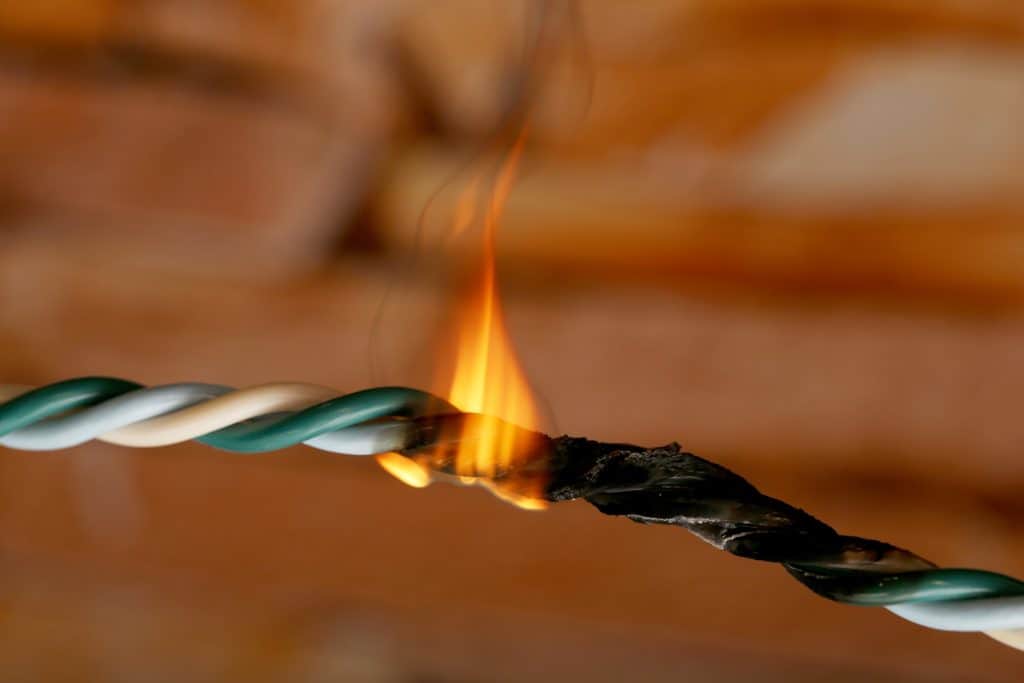Waking up to the scent of burning rubber in the middle of the night shouldn’t be ignored. Though the problem could be harmless, such as a foul-smelling animal, it’s also possible that it’s caused by a more pressing issue.
It’s better to prepare for the worst and hope for the best than to disregard the burning rubber odor altogether.
Burning rubber smells inside at night may indicate overheating appliances, damaged wires, clogged ductwork, or foreign objects in a circuit box. Outside, the odor may be due to electrical issues, neighbors’ burn pits, or damaged cars. Skunks also emit a similar scent due to sulfur-based thiols.
In this article, you’ll learn several reasons for burning rubber odors at night inside and outside the home. The article also dives into why skunks sometimes smell of burning rubber. Read on to learn more.
Top Causes of a Burning Rubber Smell at Night [In the House]
An odor of burning rubber at night shouldn’t be ignored, as it could indicate multiple potentially severe problems inside the home, including:
- Electrical fire
- Overheated appliances
- Clogged ventilation system
- Insects, rodents, or foreign objects in the circuit box
When the smell only occurs at night, consider what you do differently. If you only run certain appliances or utilize specific outlets during the evening or overnight hours, they could be the culprit.
You may notice the burning rubber odor near outlets as the insulation, polymers, or wire coverings overheat and melt.
When the scent originates near appliances you run at night, such as the dishwasher, washing machine, dryer, or air conditioner, it could indicate an overheated device. This may suggest the beginnings of an electrical fire.

Soot, charring, or sparking near outlets is an emergency; contact the fire department immediately.
Though electrical fires begin with a pungent aroma, the smell dissipates quickly. Therefore, if you notice a burning rubber scent, have it checked right away.
These fires often result from defective wiring, overloaded circuit breakers, or even insects, rodents, or other foreign objects inside the circuit box (source: John McCraw Electric).
Ductwork blocked by dust buildup can also lead to a burnt rubber odor inside the home. Clogged air filters and excessive dust in ventilation shafts cause a charred, sour smell to permeate the air when the HVAC system kicks on.
This happens when the debris heats up as the system ignites to generate heat.
Burnt dust creates fumes that are transferred through the vents into every area of the house. You can remedy this by having your ductwork cleaned.
Whenever you detect the odor of burning rubber, remain cautious no matter what you suspect the cause may be. Burning smells inside the home can indicate serious, potentially fatal problems (source: San Diego Tribune).
What Might Cause a Burning Rubber Smell Outside at Night?
Burning rubber smells outside could also indicate an electrical problem. However, it might be due to exterior wiring. Contact the fire department concerning any burning odors in or around your property.
Alternatively, the odor of burning rubber outside could suggest your neighbors are burning items and the wind is carrying the scent toward your property. The burning of old tires, garbage, and other waste may create a burning rubber smell.

Vehicles can also emit the pungent smell of burning rubber, especially if rubber parts, like belts, come loose (source: Geico). Some pieces may even come into contact with a heated exhaust or engine and melt, creating the scent of burning plastic or rubber.
Burnt synthetic oils also have an odor similar to burnt plastic or burning rubber.
Is a Burning Rubber Smell at Night a Skunk?
A burning rubber smell at night could be a skunk. However, it’s best to eliminate all other potential sources before assuming it’s an animal.
If you’re in close proximity to weasel-like mammals, you might notice the smell is reminiscent of burning rubber. This is because skunk oils contain sulfur-based compounds called thiols.
Certain rubbers form thiols after they’re superheated with sulfur to increase strength (source: Journal of Applied Polymer Science).
If you think that the smell might be a skunk, check out our dedicated article on what might cause skunk-like smells (including in the night).
Whenever you notice any burning scent in your home, don’t chalk it up to something minor; consider all possibilities. It’s better to investigate every potential source only to find out it’s harmless than to ignore it and find your home damaged as a result.

